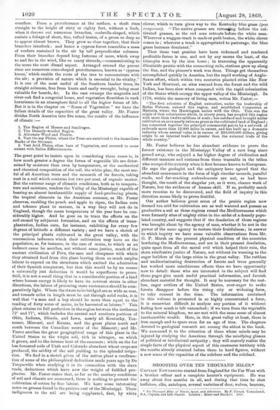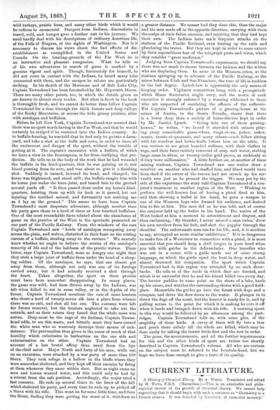SHOOTING OVER TEN THOUSAND MILES.* CAPTAIN TOWNSBEND started from England
for the Far West with a brother officer and a complete hunter's equipment. He was away about five months in all, and during that time he shot buffaloes, elks, antelopes, several varieties of deer, wolves, beavers, • Tea Thou.saad Miles of Travel, Sport, and Adventure. By F. Trench Townshend, RA., Captain 2nd Life Guards. London : Hurst and Blackett. 1869.
wild turkeys, prairie hens, and many other birds which it would be tedious to enumerate. Dangers from Indians, discomforts in travel, cold, and hunger gave a further zest to his journey. We need hardly deal with his descriptions of ordinary American life, of the Falls of Niagara, of the sights of Washington. Nor is it necessary to discuss his views about the bad effects of dis- establishment as exemplified in the United States and Canada. On the hunting-grounds of the Far West he is an instructive and pleasant companion. What he tells us of his own adventures in search of game is marked by a genuine vigour and spirit.. Though, fortunately for himself, he did not come in contact with the Indians, he heard many tales connected with them, and the escapes he relates are particularly striking. In his sketch of the Mormons and of Salt Lake City, Captain Townshend has been forestalled by Mr. Hepworth Dixon. There are many other points, too, in which the details given us are known to almost every reader. But what is fresh in the book is thoroughly fresh, and we cannot do better than follow Captain Townshend for a time through the thick forests and deep valleys of the Rocky Mountains, or across the wide grassy prairies, alive with antelopes and buffaloes.
Before he left New York, Captain Townshend was assured that there was no sport worth having in the Far West, and that he would certainly be scalped if he ventured into the Indian country. As to buffalo-hunting, he was told that he had only to go into a farm- yard, and take a shot at the bulls and cows, in order to have all the excitement and danger of the sport, without the trouble of getting at it. The captain's encounter with a buffalo, of which we have a view in the frontispiece, is far from verifying that pre- diction. He tells us in the body of the work that he had wounded the buffalo in the hind-quarters, that he was gaining on it, saw blood pouring from its nose, and was about to give it a finishing shot. Suddenly it turned, lowered its head, and charged ; his horse was frightened, and stood still ; the buffalo caught him with its horns just under the knee-joint, and tossed him to the ground several yards off. "It then passed clean under my horse's hind- quarters, hoisting them up with its back as it passed, but not injuring the terrified animal, and fortunately not noticing me as I lay on the ground." This seems to have been Captain Townshend's most desperate adventure, although another time his party gave chase to a herd of three or four hundred buffaloes. One of the most remarkable facts related about the abundance of game on the prairies of the West is the spectacle presented on one part of the Pacific Railway. From the windows of the cars Captain Townshend saw "herds of antelopes scampering away across the plain, and wolves, disturbed in their feast on the rotting carcase of a buffalo, stealing away to the ravines." We scarcely know whether we ought to believe the stories of the antelope's tenacity of life and of the boldness of the prairie wolves. These latter, says Captain Townshend, were so hungry one night that they stole a large joint of buffalo from under the head of a sleep- ing soldier. Of the antelopes, he says, that one almost got away from them, although not only was one of its forelegs tarried away, but it had actually received a shot through the heart. Taken altogether, the sport on these prairies must have been somewhat disappointing. In many places, the game was wild, had been driven away by the Indians, was left when killed to rot in some valley, or in the depths of the forest. Captain Townshend mentions the case of some hunters who drove a herd of twenty-seven elk into a place from whence there was no exit, and shot all but one. The carcases were left for future removal, but the hunters neglected to take out the entrails, and on their return they found that the whole mass was rotten. Deep must be the rage of the Indians, Captain Towns- hend adds, to see this waste, and bitterly must they have cursed the white man who so wantonly destroys their means of sub- sistence. The provocation thus given is the cause of much of that hostility which culminates in barbarities on the one side and extermination on the other. Captain Townshend had an account of a less brutal affray than usual from the lips of the chief actor. Major North and forty of his men, while out on an excursion, were attacked by a war party of more than 100 Sioux. They took refuge in a hollow in the bluffs where they were somewhat sheltered, and they kept off their enemies by firing at them whenever they came within shot. But as night came on men and horses wanted water, and this could only be had by a retreat from the safe position. Accordingly, the major tried a last resource. He rode up several times to the brow of the hill which sheltered his party, and every time he rode up he picked off a Sioux with his rifle. This went on for some little time, and then the Sioux, finding they were getting the worst of it, withdrew to
a greater distance. No sooner had they done this, than the major and his men made off in the opposite direction, carrying with them the scalps of their fallen enemies, and rejoicing that they had kept their own. The Indians have made frequent attacks on the stations of the Pacific Railroad, even tearing up the rails and plundering the trains. But they are kept in order to some extent by their superstitious fear of the telegraph posts and wires, which they consider "great medicines."
Judging from Captain Townshend's experiences, we should say there was not much to choose between the Indians and the whites who are displacing them. In some of the Western cities, at the stations springing up in advance of the Pacific Railway, at the mines between Utah and San Francisco, the tone of life is reckless to the last degree. Lynch-law is apparently the only means of keeping order. Vigilance committees hang with a promptitude which Home Secretaries might envy, and the moral of each execution is strongly enforced by a warning addressed to those who are suspected of emulating the offence of the sufferers. Yet Captain Townshend's picture of a gaming-house at the mines of Austin, in the Sierra Nevada, shows that there is a lower deep than a society of horse-thieves kept in order by Mr. Justice Lynch. "Going into one of these gaming- houses," he writes, "we found it crowded with miners play- ing every conceivable game—faro, vingt-et-uu, poker, euker, monte, trente-et-quarante, and many others—each fellow sitting with his revolver and bowie-knife before him on the table. It was curious to see great bearded ruffians, with their clothes in rags, and their faces entirely innocent of soap and water, staking large sums in silver, or twenty-dollar gold pieces, as recklessly as if they were millionaires." A little further on, at another of these mining stations, Captain Townshend saw one waiter draw a revolver on another who had chaffed him, and blood would have been shed if the owner of the tavern had not struck up his ser- vant's arm just as he pressed the trigger. We may put by the side of this experience the story told Captain Townshend of a con- juror's treatment in another region of the West. "Wishing to perform the well-known feat of having a pistol fired at him, and then showing a bullet in his hand, he gave a weapon to one of the Western boys who formed his audience, and desired him to fire at him. The man did as he was told, and of course the conjuror held up the bullet in his hand. The native of the West looked at him a moment in astonishment and disgust, and then exclaiming, 'By thunder, I never missed a man twice,' drew his own revolver from his belt, and shot the juggler through the shoulder. The unfortunate man ran for his life, and, it is needless to say, attempted no more similar exhibitions." If it is dangerous to make fun of a Westerner in connection with a pistol, it is most essential that you should keep a civil tongue in your head when you talk with guides in the Adirondacks. One traveller who was out in a canoe with a guide made use of some strong language, on which the guide upset the boat in deep water, and almost drowned his companion. The sport which Captain Townshend had in this region was attended by no such draw- backs. He tells us of the mode in which deer are hunted, and which is so successful that he and his friend killed two every day. The hunter paddles to some point on the shore of a lake, hauls up his canoe, and watches the surrounding shores with a good field- glass. Meanwhile the guides go into the forest with dogs and a compass, and drive the deer down to the water. It plunges in to throw the dogs off the scent, but the hunter is ready for it, and by pulling across to the point for which it is making he cuts it off when it lands and brings it down with his rifle. A morning spent in this way would be followed by an afternoon among the part- ridges. Captain Townshend tells us, with some glee, of the stupidity of these birds. A covey of them will fly into a tree and perch there calmly till the whole are killed, which may be done easily by taking the lowest birds first and the rest in order.
The guns, the accoutrements, and all the further requirements for this and the other kinds of sport are rather too shortly described in Captain Townshend's volume. All who are curious on the subject must be referred to the fountain-head, but we hope we have done enough to give a taste of its quality.































 Previous page
Previous page